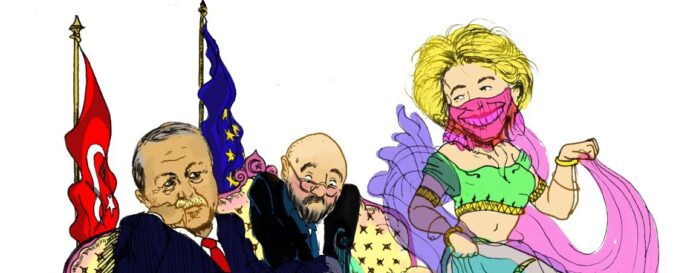Il lunghissimo cammino della Turchia verso l’entrata nella UE si arena su un divano?
Tutte le agenzie di stampa del mondo hanno mostrato una singolare foto in cui, durante l’incontro al vertice fra Ue e Turchia, la presidentessa della Commissione Europea Ursula von der Leyen sedeva su un divano a qualche metro di distanza dal Presidente turco Recep Tayyip Erdogan e dal presidente del Consiglio Europeo Charles Michel che occupavano il centro della scena sulle sedie d’onore. Ridicolo o offensivo? Più che altro problematico.
Il ritiro della Turchia dalla Convenzione di Istanbul, stipulata nel 2011 contro la violenza sulle donne, aveva già dato la misura di quanto Erdogan voglia appoggiarsi alle fasce più integraliste dell’Islam anatolico per rafforzare il suo potere. E il ruolo subalterno – o al massimo complementare – delle donne nel sistema sociale è considerato uno dei punti fermi dell’universo concettuale musulmano estremista.
Dunque il Presidente turco ha agito pro domo sua senza preoccuparsi delle conseguenze della sua scelta. Ma il presidente del Consiglio italiano Mario Draghi ha rilevato che l’episodio rivela quanto sia problematico trattare con dittatori che non rispettano i diritti civili e della cui collaborazione, però, si ha bisogno. È toccato a Draghi il compito di parlare chiaro non solo per la sua lunga permanenza ai vertici dell’Unione Europea, ma anche in quanto capo di governo di un Paese mediterraneo che ha sempre sostenuto le richieste di ingresso della Turchia nella Ue. Il Presidente del Partito Popolare Europeo Manfred Weber è intervenuto nella polemica rincarando la dose e dicendo che la Turchia di Erdogan non è un Paese libero. Ovviamente la reazione dei diplomatici turchi era scontata: convocazione dell’ambasciatore italiano ad Ankara e proteste.
Il vero problema, ben evidenziato da Draghi, è la collaborazione forzata con governi dittatoriali. La Turchia fa parte della Nato in una posizione strategica di estrema importanza. Ankara controlla gli stretti del Mar Nero, buona parte dei flussi migratori verso l’Europa e ospita forzatamente tre milioni di profughi siriani. Erdogan è in conflitto con la parte greca di Cipro per lo sfruttamento degli idrocarburi nelle acque che circondano l’isola. Per non parlare poi della contiguità del Presidente con elementi vicini a gruppi terroristici in Siria e l’aperto appoggio ad essi in Libia, dove la regione della Tripolitania è sotto controllo turco.
L’interscambio economico tra Italia e Turchia è imponente per quanto riguarda investimenti in infrastrutture, partecipazioni azionarie, finanza e armi, e a nessuno converrà prolungare la crisi. Il dinamismo – se così vogliamo chiamarlo – del dittatore turco, che si estende dall’appoggio agli azeri in Asia, alle intese con vari Paesi arabi in Medio Oriente, sta contribuendo alla destabilizzazione di una vasta area geografica di primaria importanza per gli equilibri planetari.
Sofagate, following the withdrawal from Instanbul Convention
Is Turkey’s very long journey to EU membership running aground on a sofa?
All the news agencies of the world showed a single photo in which, during the summit meeting between EU and Turkey, the President of the European Commission Ursula von der Leyen, sat on a couch a few meters away from the Turkish president Recep Tayyip Erdogan and the president of the European Counsel Charles Michel, who sat in the centre of the scene on the chairs of honour. Ridiculous or offensive? Mostly problematic.
Turkey’s withdrawal from the Istanbul Convention, stipulated in 2011 against violence against women, had already given the measure of how much Erdogan wants to lean on the most fundamentalist sections of Anatolian Islam to strengthen his power. And the subordinate role – or at most complementary – of women in the social system is considered one of the staples of the extremist Muslim conceptual universe.
Therefore, the Turkish president acted pro domo without worrying about the consequences of his choice. But, the Italian president, Mario Draghi, found that the incident reveals how problematic it is to deal with dictators who do not respect civil rights and whose collaboration, however, is needed. It was Draghi’s job to speak clearly not only for his long stay at the top of the European Union, but also as head of government of a Mediterranean country which has always supported Turkey’s requests for entry into the EU. The president of the European People’s Party, Manfred Weber, intervened in the controversy by increasing the dose and saying that Erdogan’s Turkey is not a free country. Obviously, the reaction of the Turkish diplomats was taken for granted: summoning of the Italian ambassador to Ankara and protests.
The true problem, well highlighted by Draghi, is the forced collaboration with dictatorial governments. Turkey is part of NATO in a strategic position of extreme importance. Ankara controls the Black Sea Straits, a good part of the migratory flows to Europe and forcibly hosts three million Syrian refugees. Erdogan is in conflict with the Greek side of Cyprus for the exploitation of hydrocarbons in the waters surrounding the island. Not to mention the contiguity of the President with elements close to terrorist groups in Syria and open support for them in Libya, where the Tripolitania region is under Turkish control.
The economic exchange between Italy and Turkey is impressive in terms of investments in infrastructure, shareholdings, finance and weapons, and no one will agree to prolong the crisis. The dynamism (if we want to call it that) of the Turkish dictator, which extends from support to Azerbaijanis in Asia, to agreements with various Arab countries in the Middle East, is contributing to the destabilization of a vast geographical area of primary importance for the planetary balance.








